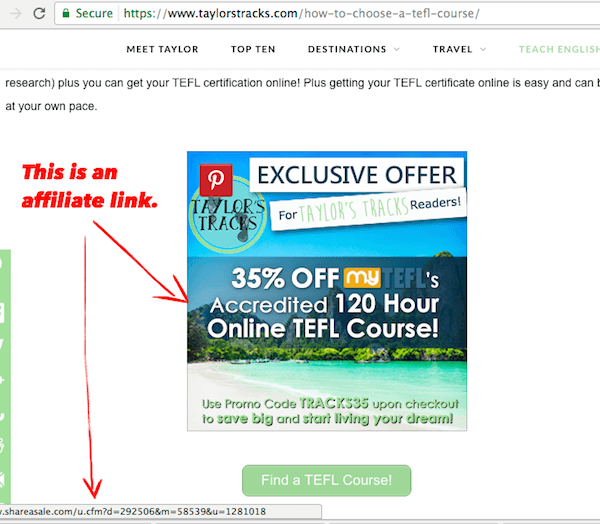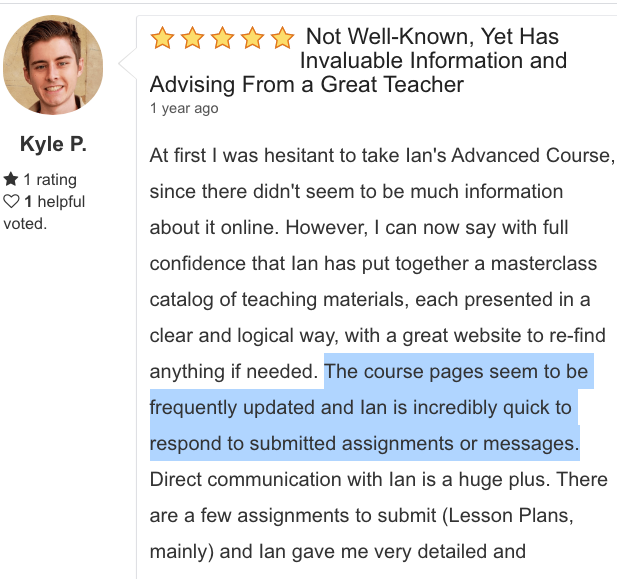Are you dizzy, dazzled and confused by all of your options for online TEFL courses? Ever been to the toothpaste aisle to get some toothpaste and just felt overwhelmed?
Which one?!
It's quite similar when it comes to TEFL courses.

I know it's tough deciding sometimes. I have taken two TEFL/TESOL courses: one online and one in class.
You have an array of options. I don't even know how many, but lets say over 50 and that's too many.
So how can you decide?
I put this little guide together, so that it might help you. It's based on my experience teaching in Asia.
You might also be looking for different viewpoints, so first I'll introduce you to the different personalities that you will run into on the web in your search for a TEFL course.
And then you'll learn some criteria after that to help you choose a good course. And lastly you can see what everyone else is doing.
Which online TEFL is best?
IT DEPENDS who you ask.
You are going to get different answers from different people, but there are similar mindsets. Let's meet them.
Here are 7 personalities that you'll meet online in your quest for the best online TEFL course
These are the different kinds of personalities and what they have to say about TEFL courses and the ones they recommend or not.
So I grouped them into the following personality types and biases.
1. CELTA snobs (and that includes Trinity TESOL and other CELTA clones)
No, I am not saying that everyone who takes a CELTA course is a snob but, there sure seems to be a lot of them.
So if you ask this person which course you should take they'll make comments like, "online TEFL courses are a joke", that "they are totally useless" or "...not worth the paper they are printed on".
There can be some truth to what they say, but it's not an absolute truth.
Is CELTA even an online course?
Not really.
But they do have one course that is partly online.
But if you go to a site like Reddit (r/tefl) or Quora and ask this question you are going to get some answers from people who ONLY support CELTA.
This person is likely a traditional learner.
They are very dogmatic and they believe...
If there is no observed classroom teaching experience w/ feedback (from a CELTA snob^^) then it's totally pointless. It's one way or the highway for the CELTA snob.
And...
I just wanted to add my two cents and that's that everything I learned about teaching I learned from watching other teachers or by reading about it. There was no snob in the back of the room judging me.
There are quite a few of them.
2. The affiliate marketer (they are widespread in TEFL)

So if you ask this person which online TEFL course you should take they will definitely have a suggestion, but what you don't know is that they are making money off of you when you buy the course they recommend.
These are often teachers (your peers) whose motives are not so transparent. There is a lot of affiliate marketing in TEFL. It can happen on blogs, Youtube, Quora, Reddit and pretty much any site.
If you click on their link they will make money if you then purchase that course.
Learn more about affiliate marketing in TEFL and what it looks like.
There are lot$ of them. And no I don't do affiliate marketing.
3. The direct marketer
This person works for or is the company that they are recommending. They may be transparent and honest or they may be a "sockpuppet" or use other devious tactics.
You could call me one of these, but ESLinsider's courses are not for everyone.
4. The renegade
If you ask this person what TEFL course you should take they might say "don't take a TEFL course".
The renegade won't recommend any TEFL course whether it was in-class or online. They might be savvy types who recommend the DIY path.
They are few in numbers.
You could also call me one of these as I did once write an article called, "TEFL courses are a waste of money".
5. The cheapo
If you ask this person which course should I take they will say, "the cheapest one".
This person is a bargain hunter, doesn't usually care much about teaching and is just looking for the cheapest certificate that they can get so that they can "check the box". They assume all TEFL courses are the same so why not just get the cheapest one.
There are quite a few of them on Reddit where you'll find a mentality of "get the cheapest you can get or a CELTA".
6. The parrot
If you ask this person which TEFL/TESOL course you should take they will probably say whateveryone else says: an "internationally recognized" or an "accredited" one that's "120 hours".
This person might not have even taught abroad and may have came to his/her conclusions in just a few minutes after a Google search. They don't actually know much about the TEFL industry and may recommend any course that is "accredited" or "internationally recognized", but little do they know that these terms are misleading as there is no one accreditation in TEFL.
And aside from a university accredited course like CELTA, accreditation in TEFL is just another layer of business and it's sometimes deceptive.
7. The fake reviewer
Fake reviews are a huge problem on the internet. People will lie right to your face because it's easy to do online since they aren't actually standing in front of you. For example, on Amazon alone there are a reported 200,000,000 fake reviews and on Yelp 1 in 4 reviews is fake (25%).
Is it any different in TEFL?
No, there are lots of lies, fake accreditation, fake reviews and totally fake review sites that claim to be "Trusted".
8. The honest reviewer
This person actually took a course and has no ulterior motives to make money. They are not an affiliate marketer.
They are fewer in numbers.
You're confused because of all the COPYCATS
If you ask me they are all trying to at least look or sound like a CELTA course. They'll claim to be "internationally recognized" (as if they are famous), "accredited" (by someone you know nothing about), "120 hours+" (those are fake hours online), and basically just try to look and sound like a university (more on that later).
Because hey, that's what CELTA did and it worked.
And that's what the other copycats did and it worked.

What?
Zebras?
Let me explain.
I was watching an interesting video with Jordan Peterson (about creativity) talking about zebras and that it's not that their black and white striped coat camouflages them, but rather when they are together in a herd a lion can't pick one out, but as soon as you mark one with a different color paint a lion can get them.
So in other words it's easier and safer to look like and do what everyone else does.
Because if you do something different it might not work.
Chances are you don't actually want the truth
Chances are you just want to fit in and get a job.
Right?
Besides what if you take a different sounding course with no "hours" (even if they are fake) or that's not "accredited"?
Whoaa!
Fake hours and "accredited" sounds safer right?
Because that's what everyone else is doing.
You just want to fit in like those zebras.
No?
More on this at the end.
So...
What criteria should you use to choose a course?
You're new to TEFL so you are probably wondering a lot!
There are 2 basic reasons to take a TEFL course.
- Find a job
- Learn how to teach
1. Find a job
I think a lot of newcomers place an emphasis on number 1. At this point you are probably more concerned about getting started teaching (by finding a job) and getting there, right???
So based on that criteria a course that is "reputable", "accredited" or that claims to be "internationally recognized" sounds appealing.
However, those words which are commonly used by TEFL course providers are ambiguous.
"...For EFL in Asia, those accreditations don't matter at all, but they are necessary in some Western countries...
If you want to teach in Korea/Japan/China/Thailand, etc. it really doesn't matter. Busan through EPIK requires some in-class hours, but otherwise all certificates are pretty much equivalent in the school's eyes." - Tomli
So based on that quote any course would cover your first reason mentioned above.
I took a course that claimed to be reputable, internationally recognized and accredited. However when I got to Taiwan I learned that those things didn't really matter.
One I didn't need a TEFL/TESOL certificate to get a visa. My degree and experience (lack of it at the time) was more valuable.
Two I didn't learn or retain much of anything that actually helped me to teach the kids that I was teaching in Taiwan.
2. Learn how to teach
So what I learned from that was that number 2 - the actual teaching and not the job was way more valuable. And I think all of the courses out there will tell you that their training is good and that it will prepare you to teach abroad.
And it may.
But it might not do that very well. The best training will focus on training you to teach the students that you are going to be teaching.
Do you know who you are going to be teaching?
Most courses focus more on teaching adults and not kids.
There are problems with online courses because many are not any good or engaging.
The best way for me to learn was by watching other teachers. It wasn't by reading or searching online. So I made a lot of instructional videos shot in the classrooms where I was working and then later I started to make courses especially focused on teaching the students who I taught.
Now here are some factors to consider that may help you choose an online TEFL course.
If you want the cheapest and easiest
Nothing cheap or easy is likely to produce much of a result as far as learning goes.
Groupon or this is is maybe the cheapest. But if you want quality then you are in the wrong place. These courses are cheap for a reason.
I took one on Groupon, just to see what I would get for $39.
These are not especially engaging courses. There typically is no feedback, because feedback takes time and these courses are cheap. These are mostly text based courses where you will read and answer questions.
The problem is that you aren't likely to remember much of what you learn.
If you want the most expensive
Take the University of Toronto course ($900-1200+), but it's actually run by a recruiter. And it doesn't sound remarkable to me so it sounds like you are basically paying for that name on a certificate.
If you want to remember what you learn (and you should)
I think this is one of the most important factors when choosing a course.
- Online you need a course that is visually appealing (media rich) that will include a lot of instructional videos.
- Writing assignments
- Repetition and practice
- Feedback
- Long term access helps as it's better to take your time vs. rushing.
- Something practical because you won't remember abstract things like theory and terminology. What classes do you remember from high school and college? What ones can't you remember?
Learn more about the research behind what makes a good course.
If you want the most reputable course
Take the CELTA. It's accredited by the University of Cambridge. CELTA does offer a blended course, however it's not totally online. You will have to take some of it in class.
There is no one online TEFL accreditation in fact I counted at least 23 and some are fake. There are only independent accreditors (businesses) who grant accreditation after they "inspect" a course and receive money.
What about an "120 hour" course?
There is literally no such thing online. It's mostly more ambiguous TEFL marketing. Some people complete their so-called "120-160 hour" online TEFL courses in less than 10 hours.
If you want long term access
You have fewer options as some popular online courses have access that only lasts 2-3 months (i-to-i, myTEFL). There is a "company" that offers 12 months access, but any TEFL course that uses the words "college" or "university" when they have nothing to do with being a university is scammy.
Long term access offers more flexibility and also helps if you want to review material when you start teaching. If you take a course that only offers 2-3 months access then by the time you actually start teaching you won't be able to review it.
TEKA offers unlimited long term access.
If you want to teach adults
Then take a CELTA or maybe any other course unless they say it's for "young learners". But as far as I can tell most courses including the two I took focused more on adults.
Now many will say that what's in a course like CELTA or any other course will carry over to teaching children, but that is only partially true. Some stuff will not apply.
If you are going to teach children
Then take a course targeted at teaching children or "young learners" because chances are you will be teaching children. In East Asia alone you are looking at 7-8 jobs out of 10 is for teaching children. ESLinsider's courses focus more on teaching children (especially in East Asia).
If you are a savvy rebel
Don't take one.
DIY.
I won't tell you how to teach yourself because if you are savvy you can figure it out.
If you want "real" classroom instruction
You don't get that online. Take an in-class course and remember that it is usually mock or pretend classroom instruction.
If you want popular
Then check the reviews, but keep in mind that many are fake or written by affiliates (mentioned above).
Then consider for a moment your favorite restaurant vs. the most popular such as McDonald's or some other chain. Which is best?
"Regardless of how you measure 'best' (elegance, deluxeness, impact, profitability, ROI, meaningfulness, memorability), it's almost never present in the thing that is the most popular." - Seth Godin
And you might want to consider this or what everyone else is doing at the end of the article.
If you want to teach in ____ (insert country)
Choose a course that helps you to do that. Some courses out there blog and offer free resources.
ESLinsider focuses more on teaching in East Asia.
If you want job assistance
Find one that offers that.
But...
You can find more jobs on your own if you just look.
Be warned that any TEFL course provider out there can only offer a small percentage of jobs compared to what you can find on your own. I took a course that offered "guaranteed jobs", but they had very few jobs where I wanted to teach.
I ended up going there (to Taiwan) to find work.
If you want transparency
Then look at their 'about' page. But don't expect to find much since many are not transparent about who they are.
There is a lot of posturing, fronting and lies in TEFL.
So I decided to be more transparent about my own site and you can take a look at who runs ESLinsider here.
If you are still confused
Research and then divide your choices into 3 piles of paper. Choose what looks like the best one for each pile based on the criteria you used to choose it in the first place. Then take your last 3 and choose one.
My recommendation
As I mentioned before I am the creator of ESLinsider's course, but I don't recommend those for people who want to teach mostly adults or are just in it for the certificate.
I highly recommend them for people who want to teach mostly kids in Asia. These are targeted courses and as others have said they are "practical".
Other than that I can think of 2 other options that might work.
WHAT IS EVERYONE ELSE DOING?
"If you do what everyone else does then you'll get what everyone else does..."
- Paul Rulkins (TED X - Why the majority is always wrong)
I see a lot of questions being asked on different sites about TEFL certification. Most people are just concerned with taking a course to get a job. They are thinking short term. But short term thinking doesn't lead to success.
Ever hear of the marshmallow experiment?
Successful people think long term not short term.
What comes after getting a job?
Teaching English abroad isn't a vacation. It's at least a year long experience for most. If you want to have a good experience you got to think long term and...
What's more important than getting a job is doing your job.
Lots of people will take cheapo courses on Groupon or look for a fancy accreditation that's supposedly "internationally recognized" because they are just focused on getting a job or think they may get a better job. But the truth is many of those people end up not having a good experience.
You can see some examples here.
Where to get TEFL online?
Figure out who you will be teaching (adults or kids). Then take the course catered to teaching that age group. If you take a course online you need visuals with classroom instructionals to learn. Watching other teachers is the easiest way to learn and if your online TEFL course is text based you won't remember much and that means teaching will be difficult.
Do plenty of research on the course and what you will learn. Things like accreditation and reviews only scratch the surface and they can be gamed.
Here's a review from Kyle...
The bottom line is if you want to have a better experience abroad you have to focus on learning vs. just getting a certificate and TEKA is a course focused on that.

